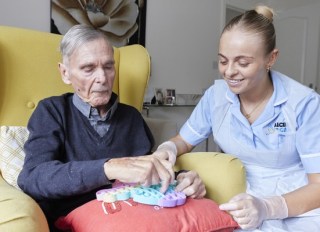Birmingham, with its dynamic networks and different populace, is seeing a rising interest for home consideration administrations. This development is driven by a few variables, including a maturing populace, headways in medical services that permit individuals to reside longer, and a developing craving for people to remain in their homes as opposed to moving into private consideration settings. The adaptability, solace, and personalization that home consideration administrations offer are certain. They give a comprehensive methodology that thinks about actual wellbeing, yet profound and mental prosperity.
In this part, we dive further into the various parts of home consideration in Birmingham, including the advantages of specific consideration, the job of innovation in improving administrations, and the meaning of cultivating serious areas of strength for a patient relationship.
5. Specific Home Consideration Administrations
As individuals age or face wellbeing challenges, they might require more specific consideration that goes past broad help. Birmingham home consideration suppliers are prepared to deal with various ailments and necessities, guaranteeing that people get the help home care birmingham they need. These specific administrations are progressively significant as the populace proceeds to mature, and medical issue like dementia, Parkinson’s infection, and stroke recuperation become more common.
5.1 Dementia and Alzheimer’s Consideration
Dementia and Alzheimer’s sickness influence a great many people around the world, and the numbers are rising consistently. Home consideration administrations in Birmingham are especially centered around supporting those with mental disabilities. Dementia care goes past giving help everyday assignments; it likewise incorporates establishing safe conditions, executing memory helps, and utilizing restorative exercises intended to animate mental capabilities.
Prepared parental figures assist people with dementia explore their day, lessen disarray, and offer profound help. Organized exercises like music treatment, memory treatment, or light actual activities assist with keeping up with mental capability and deal solace. Moreover, parental figures are prepared to manage the occasionally difficult ways of behaving that can emerge with dementia, like disturbance, hostility, or tension, guaranteeing the prosperity of both the individual and their relatives.
5.2 Post-Clinic and Recovery Care
After an individual is released from the emergency clinic, they might need help with their recuperation at home. Post-medical procedure care, stroke recovery, and restoration following mishaps or wounds can be generally overseen through home consideration administrations. In Birmingham, many consideration offices give particular restoration care, assisting people with recapturing versatility, autonomy, and strength.
Whether it’s assisting with physiotherapy works out, observing fundamental signs, or helping with exercises like dressing and washing, post-clinic care guarantees people recuperate securely and serenely at home. It likewise gives relatives inward feeling of harmony, realizing that experts are assisting their friends and family through the recuperation with handling.
5.3 Parkinson’s Sickness Care
Parkinson’s illness is a dynamic neurological condition that influences development. Home consideration administrations in Birmingham are intended to help people residing with Parkinson’s by supporting with versatility, offering drug the board, and assisting with active recuperation works out. Since Parkinson’s side effects frequently vacillate, guardians are prepared to adjust to these changes, giving customized care that obliges each phase of the infection.
6. Mechanical Headways in Home Consideration
The joining of innovation into home consideration administrations in Birmingham has improved the capacity to give productive, customized, and financially savvy care. As innovation keeps on developing, home consideration suppliers are consolidating further developed apparatuses that help both the guardian and the individual getting care.
6.1 Telemedicine and Remote Observing
Telemedicine, which permits medical services experts to give care from a distance, is changing the home consideration scene. Through video conferences and remote observing apparatuses, medical care suppliers can follow a person’s important bodily functions, side effects, and progress. This takes into account all the more ideal intercessions, diminishing the requirement for incessant emergency clinic visits.
In Birmingham, telemedicine is by and large progressively used to screen constant circumstances like diabetes, coronary illness, and hypertension, it are gotten right on time to guarantee that any vacillations. Far off wellbeing checking gadgets, for example, smartwatches and wellbeing sensors, can follow pulse, circulatory strain, and action levels, furnishing parental figures and clinical experts with important information to change care plans on a case by case basis.
6.2 Savvy Home Gadgets
Savvy home innovation is another region that is having a massive effect on home consideration in Birmingham. Gadgets like voice-actuated partners, computerized lighting, and savvy locks help people living with dementia or other mental weaknesses live more autonomously. For instance, a voice-enacted collaborator like Amazon’s Alexa or research Home can be set to remind a person to take their prescription, eat feasts, or participate in an action, lessening the dependence on guardians for fundamental updates.
Furthermore, savvy wellbeing frameworks like movement locators, fall identifiers, and individual crisis reaction frameworks (PERS) can alarm parental figures in the event that something turns out badly. This innovation gives a layer of safety to individuals living alone or with portability issues, giving families the consolation that their friends and family are protected, in any event, when they are not truly present.
6.3 Medicine The board Applications
Overseeing prescriptions is a fundamental piece of home consideration, particularly for people with persistent sicknesses or complex wellbeing needs. Birmingham home consideration suppliers progressively depend taking drugs the board applications to assist people with keeping focused with their endorsed prescriptions. These applications can send suggestions to take meds, track measurements, and even give data about possible aftereffects.
Guardians can utilize these applications to guarantee that prescriptions are required some investment and in the right measurements, forestalling difficulties connected with missed portions or blunders. This component is especially useful for people with dementia or mental weaknesses, who might experience difficulty recollecting when and how to take their drugs.
7. The Guardian Client Relationship: Building Trust and Solace
The parental figure client relationship is at the core of home consideration administrations in Birmingham. For people getting care, having a reliable, empathetic parental figure is fundamental to keeping up with profound prosperity and guaranteeing that they feel good in their own homes.
7.1 Structure Compatibility and Correspondence
A solid parental figure client relationship starts with open correspondence. Parental figures who listen mindfully and participate in discussions with their clients assist them with feeling esteemed and comprehended. In Birmingham, home consideration suppliers center around employing parental figures who have solid relational abilities and compassion. At the point when parental figures carve out opportunity to grasp the singular’s very own inclinations, previous encounters, and natural schedules, they can offer better, more custom-made care.
7.2 Regarding Freedom and Pride
At the center of home consideration is the comprehension that people ought to hold their autonomy and nobility. Home consideration laborers are prepared to offer help that urges people to do however much for themselves as could reasonably be expected. Guardians expect to offer help with a way that regards the individual’s independence, permitting them to keep up with command over their everyday exercises while getting the assist they with requiring.
7.3 Friendship and Basic encouragement
As well as giving actual consideration, parental figures frequently go about as mates, offering consistent encouragement and combatting sensations of forlornness or confinement. This is particularly vital for people living with persistent circumstances, dementia, or the individuals who have lost the capacity to collaborate with loved ones as they once did. Friendship is a vital piece of working on emotional well-being and lessening tension or wretchedness.
8. Supporting Families through Schooling and Preparing
Home consideration suppliers in Birmingham likewise perceive the basic job of family parental figures in overseeing care. Relatives frequently feel overpowered, especially when they are liable for the day to day care of a friend or family member. That is the reason many home consideration organizations offer parental figure support programs that give preparing, assets, and everyday encouragement.
8.1 Parental figure Preparing
Parental figures get broad preparation in different regions, including individual consideration, dementia care, wellbeing conventions, and medicine the executives. Families can likewise get to parental figure preparing assets to master new abilities, for example, how to assist a friend or family member with portability difficulties or how to discuss really with somebody who has Alzheimer’s infection. Preparing can lessen pressure, construct certainty, and assist family parental figures with feeling improved prepared to deal with their cherished one’s necessities.
8.2 Basic reassurance and Reprieve Care
For family guardians, reprieve care gives a significant chance to enjoy some time off from providing care obligations. Whether it’s for a couple of hours or a couple of days, reprieve care permits relatives to re-energize, deal with their own necessities, and stay balanced. Home consideration suppliers additionally offer daily reassurance through advising administrations, support gatherings, and direction on dealing with the inner difficulties of providing care.
End: The Fate of Home Consideration in Birmingham
As the populace proceeds to mature and medical care needs become more mind boggling, home consideration administrations in Birmingham will keep on developing. The mix of innovation, specific consideration models, and customized consideration will keep on molding the eventual fate of home consideration, offering more noteworthy solace and autonomy for people who wish to stay in their homes.
Home consideration suppliers in Birmingham are committed…

